Personalization is everywhere.
But what does personalized marketing mean to you?
If I was to define personalization in the most simplest words – Personalization is a marketing strategy that is completely customized to the needs of each individual customer. Personalized marketing is essentially the most focused form of targeted marketing.
Personalization in travel industry marketing is equivalent to offering a personal travel agent to each of the customer. For today’s travelers who are increasingly becoming impulsive and want information in seconds, travel brands have no choice except evolving their digital marketing technologies to meet customers’ rising expectations for assistance at every point of the purchase journey.
What are the Current Challenges that Travel Industry Marketers Face?
According to Sabre, a global B2B travel marketplace, 83% of customers expect personalized information and product recommendations. With the huge amount of customer data that travel brands have at their disposal – demographic, behavioral, geo-location data, and so much more, the opportunities to personalize the customer journey are endless.
But easier said than done.
With rising competition ephemeral brand loyalty, the challenges in from t of marketers like you are not just one. There are many.
- High customer acquisition cost: The cost of acquiring customers has been very high. As per this article, the average cost of acquiring just one customer in the travel sector is $7.
- Challenge in creating a unified view of the customers: The customers of today, who are almost always online on a number of devices, traverse a non-linear customer journey. With data coming in from multiple touch-points all the time, it is a challenge to maintain a unified view of the customer. And it is needless to mention that a 360 degree view of customers is the prerequisite to utilize data for personalization.
- Low conversion rate: The conversion rate in this sector is quite dismal – swinging between 1-3%.
- High booking abandonment rate: Travel industry witnesses one of the highest booking abandonment rates – as high as 80%. While there can be multiple reasons for users dropping out, a non-personalized website and app experience is a big one.
- Dwindling brand loyalty: Today’s customers are not brand loyal, they are experience loyal. While brands can offer competitive prices, what it really takes to keep the customers coming back is deep levels of user experience personalization.
How Can AI/ML Based Personalization Help In Improving Customer Acquisition & Engagement?
What we as consumers are seeing today is marketing war. And the key skill needed to keep winning this war is simple – serve the right content to the right users at the right time across all the touch points. As I said earlier, it is easier said than done. With the overwhelmingly huge amount of data, it isn’t humanly possible to derive actionable insights, and keep up with the customer expectations.
But why fear when AI is here!
AI offers travel marketers like you to impactful ways to cut through the clutter and establish meaningful conversations with their users to ensure their brand messaging resonates (and stays) with the customer.
AI/ML Based Personalization
All the power lies in customer data. AI-powered personalization engines, take customer eyeball data as input and based on the behavioral patterns, predict the future actions of the users. These predictions form the basis of your personalization efforts.
Smartech’s AI engine, Raman, delivers personalized recommendations right from the start till the end, at each step of the customer journey.
Here are a few scenarios/examples wherein you can use AI based personalization to improve the customer acquisition and engagement of your brand.
- Personalize Home Page Recommendations: Based on search history, the most relevant information is shown to the users right at the home page of your website. For instance, here in this sample, since the user searched for stay options in Malaysia, he is shown the best deals in Malaysian hotels. Serving this content in the homepage increases the chances of faster booking. Personalized home page recommendations can get 80-90% higher CTRs.
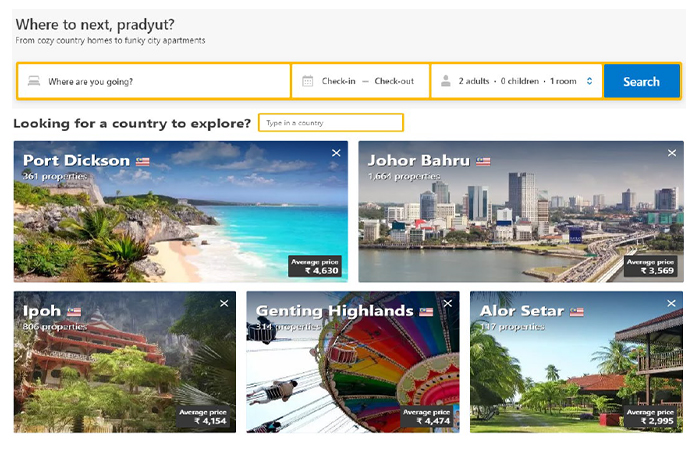
- Product Display Recommendations: Another way to engage and nudge the users towards booking is by showing relevant product recommendations based on the users’ interest. The more contextual the recommendations, the higher the chances of conversion. You can show travel packages, hotel deals, sightseeing packages etc. These recommendation can help you achieve 30-50% higher CTRs.

- Category page Reordering: If the user finds the products of his/her interest easily, the more likely he is to browse them. You can re-order the product categories in real-time, to show the users’ preferred products first. For instance, if the propensity of a user to check out apartments more than villas or resorts, then you can reorder the recommendations such that apartments are shown at the top. This kind of personalization can result in 60-80% higher CTRs.
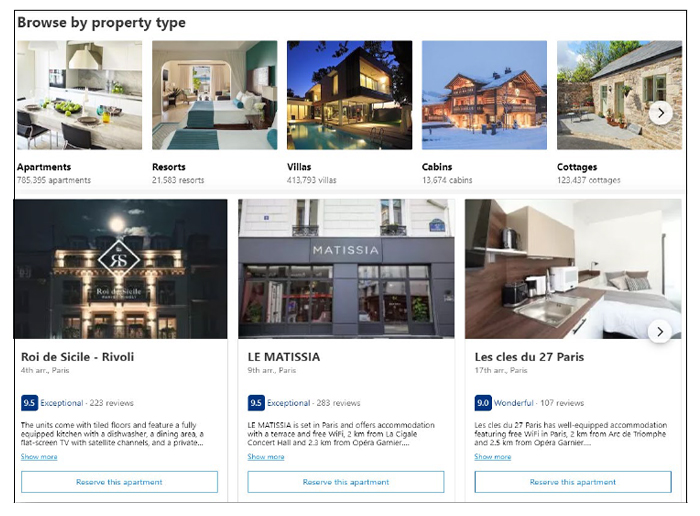
- Customize Exit intent Popups: Travel customers today, are spoilt for choice. The price sensitive user segment (which may be a huge segment of your total users) often tends to leave your website in search of better deals. If the visitor tries to leave, a personalized exit popup specific to their interest can re-invoke the interest and intention of the user. These pop ups can help in reducing the website bounce rates by 5-7%.
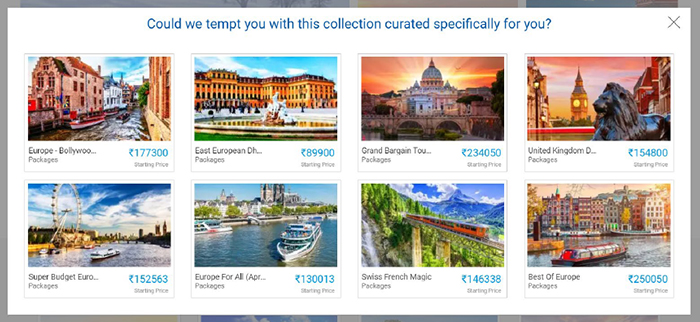
- Personalized Emails: While all the above are onsite personalization examples, you can also deliver personalized recommendations through other channels like email, push notifications, ads, etc.
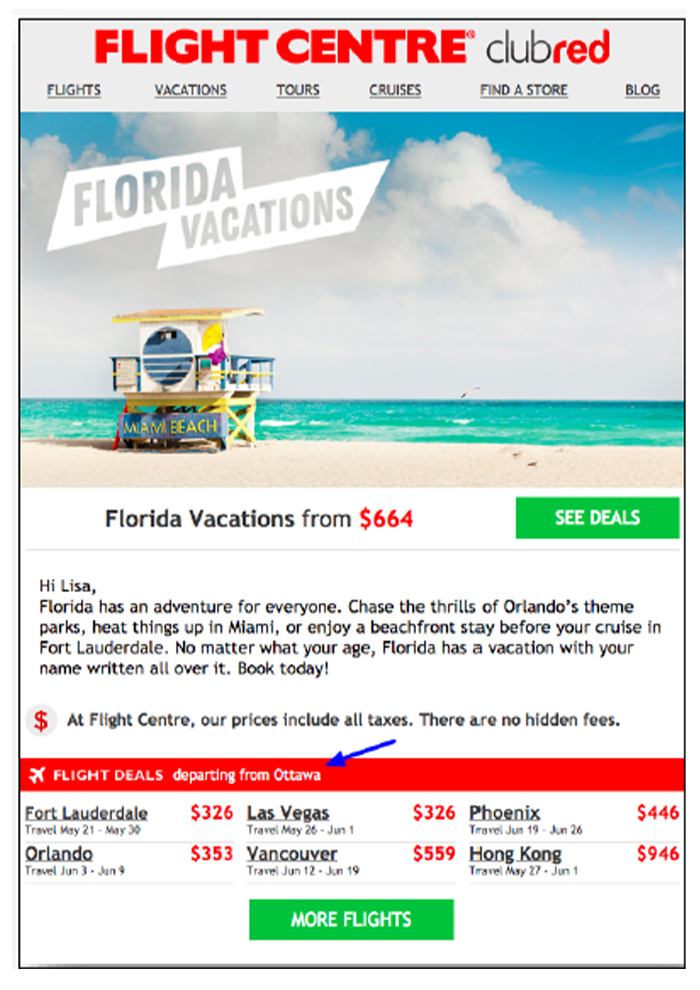
For instance, the following email provides all relevant details around a potential purchase.
- Personalized Push Notifications: Like emails, you can also send personalized push notifications to your app users to engage them and push them towards conversion. Highly personalized push notifications lead to 40-60% higher CTRs.
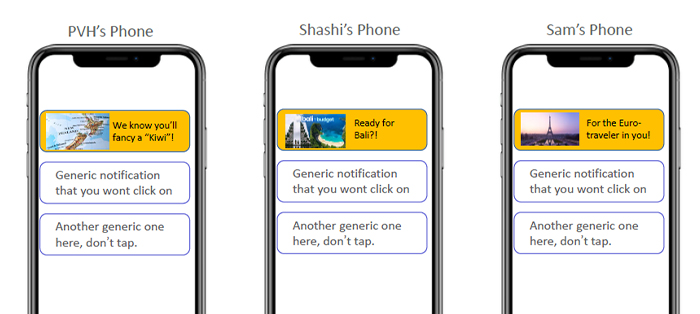
Rule Based Personalization
Rule-based personalization enables you to design the website experience for your users based on user demographics like location, time, device type and similar other parameters. Check out this article to understand more about how does rule-based personalization work.
Here are a few examples of how you can implement rule-based personalization for your travel brand.
- Personalized Home page banner: Website homepage personalization is the second most popular type of personalized experience that marketers across industries use. Given that travelers today spend a lot of time researching about their travel plans, the more relevant the content on your website, the higher the chances of conversion. While for new visitors, the homepage can be personalized with a welcome message, returning visitors can be exposed to a page customised on the basis of their past website behavior.
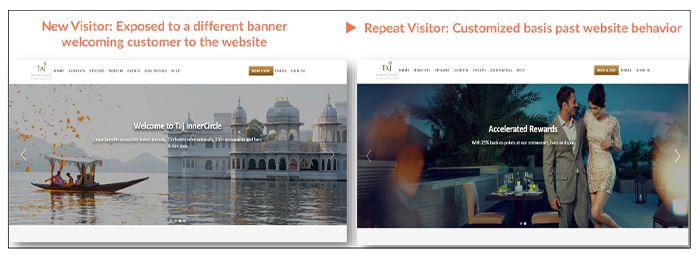
- Personalize based on past browsing behavior: Travelers, on an average, browse 38 websites before making a booking. So, the browsing behavior, on and off your website and app must play an important role in crafting the experience you offer to the customers. Based on the past behavior – destinations, places of accommodation, tickets, etc. you can show relevant offers, packages and so on to the customers. The right content can nudge them towards making the purchase. The images and CTA can also be customized accordingly.
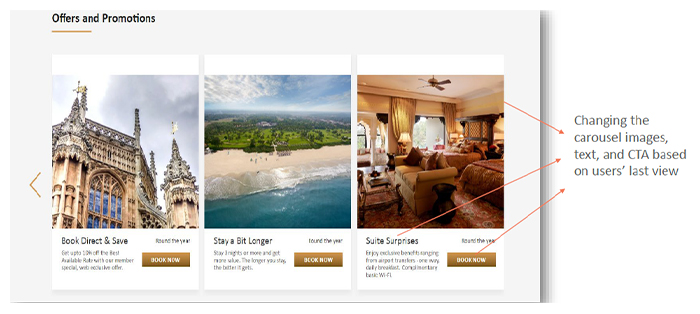
- Personalize based on location: Show personalized offers based on the users’ location and day of the week. This is where utilizing the geo-location information is that secret ingredient that makes your marketing content fly!
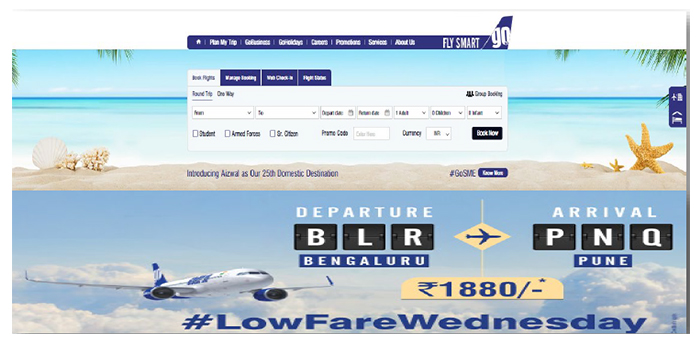
Getting Started with Smartech’s Personalization Module
It takes less than 15 minutes to integrate Smartech’s personalization module to your website or app. Here’re the components you need to integrate:
- JS Snippet on the Header
- JS Snippet on the Thank You Page
- Content Feed
Note: If you already use Smartech’s Automation Suite, you can activate Rule-based Personalization immediately at the click of a button.
Check out Smartech’s Travel Solutions
Concluding Thoughts
The advent of AI & ML in digital marketing has brought along endless opportunities to implement hyper-personalization marketing strategies. From offering tailor-made website pages to delivering personalized marketing content, from providing conversational interfaces to personalized recommendations, AI-powered personalization has immense power to transform every facet of the customer journey. The key is to identify how AI can help your brand’s core value proposition and empower you to consistently offer a superior customer experience.
This blog post has been repurposed from our webinar series ‘Personalization Thursday’ titled ‘Book an uplift in conversions by 9-12% with AI-led Travel Recommendations’. The post includes key insights shared in the webinar with some additional information.







